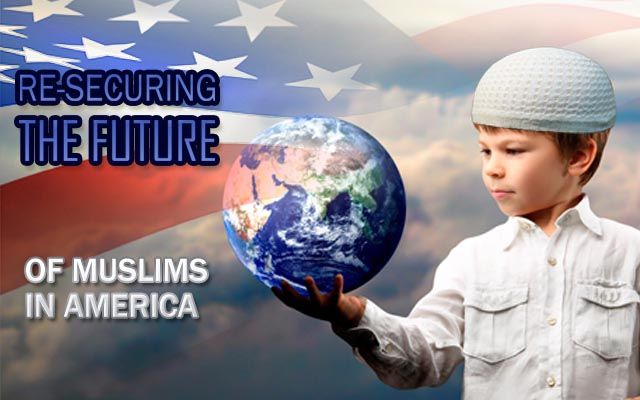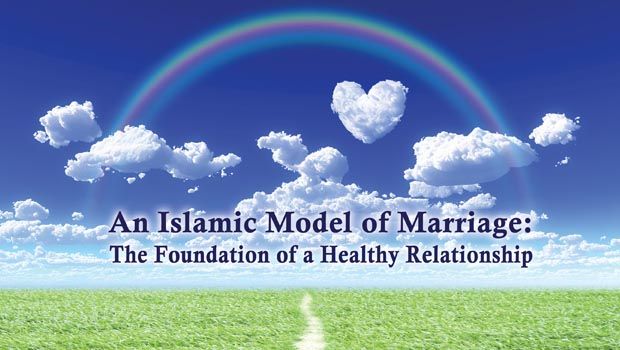When a tragedy strikes, whether natural disaster or man-made catastrophe, there is death and destruction. Human suffering mounts as people are disoriented and mentally and emotionally devastated. This jolting experience changes their worldview forever. Neighbors, relatives, and friends come together to help shoulder the grief and provide moral and other forms of support they are able to offer. This is humanity at its best, though for unfortunate reasons.
Strong, upstanding young Muslims, born and raised in America, confident and committed to their values, intellectually enlightened with a balanced global perspective
As human beings, we all aspire to the surety that our children and grandchildren will enjoy a prosperous, bright, and secure future. The third generation of the immigrants who arrived in the United States from many parts of the Muslim world in the ‘60s and ‘70s is just about reaching college age. That first generation had various challenges to face. Their economic survival, social adjustment, and identity preservation were the major issues. There was no Muslim community to belong to, no masjid to go to, little awareness or availability of halal meat and other food items, and Islamic schools or riba-free financing were still consigned to the imagination.
Today, al-humdulillah, Muslim communities are flourishing, thousands of masajid across the country provide anchor and inspiration, hundreds of full-time Islamic schools are up and running, halal meat stores are at every block in some major cities, and Islamic financing is offered by many groups and institutions. Moreover, several national and regional organizations represent and advocate Muslim views and concerns, and dozens of Muslims currently, with ever-growing numbers, hold public office at various levels of the government. This is amazing progress in just a few decades as so many have worked with devotion and sacrifice so that Muslims can shape their lives in an accommodating environment and support system.
It is natural for those who have set this stage to expect the younger generation to take the Muslim presence to the next level, socially, intellectually, and politically. Unlike their predecessors, however, the challenges the younger generation faces are totally different. The horrific tragedy of 9/11 has, unfortunately, changed the social and political landscape of this country for Muslims. There is no question that those who committed this crime against humanity were twisted in their evil-minded purpose and terrorist operation. Nationals of some 90 countries lost their lives, including many Muslims.
The whole world was shocked, condemning the evil act and standing firm against the barbarous violence. It was a moment of opportunity to create alliance through mature and rational discourse and a re-commitment to social justice everywhere as a means to ameliorate the conditions and dismantle the apparatuses systemic to a violence-prone world. Then an unyielding resolve to bring the perpetrators to account for their murderous deeds proceeds naturally, with sanction and moral rightness. Many Americans question whether the last decade of our national history has unfolded accordingly.
Exacerbating the national tragedy, too many seized the event as an opportunity to exploit public fear and forward their own objectives. An army of experts on terrorism was born overnight, flooding the written media and airwaves with distortion and manipulating demagoguery, stereotyping Muslims and vilifying Islam. The collective impact of this feeding frenzy was that Islam, Muslims, and terrorism became synonymous in the public mind.
There can be a natural bonding between Muslims and other Americans who cherish the same values and decry both radicalism and bigotry
Others worldwide used the 9/11 tragedy as a pretext to advance their repressive agendas. Tyrants were empowered and emboldened to further subjugate, within their own populations, political opponents or enemies, or those who sought liberation — all in the name of fighting terrorism. Yemen, Bahrain, Egypt, Libya, and Syria are examples of such repressive regimes that got a free hand. During this time, many genuine reformist and pro-democracy movements suffered serious setbacks, losing foothold and momentum in their campaigns for freedom and justice.
The tenth anniversary of 9/11 was recently observed across the country. Many Islamic organizations participated in the memorial ceremonies. The sad poignancy of what was being commemorated was very raw and all too real. Also real and disturbing is the cost of the “war on terror” over the last decade. According to a new report by the Eisenhower Research Project based at Brown University’s Watson Institute for International Studies, the wars in Afghanistan, Iraq, and Pakistan will ultimately cost between $3.2 and $4 trillion; the money borrowed to pay for the wars has resulted in $185 million in interest payments thus far, with an estimated $1 trillion more in interest alone accruing through 2020; deaths of military personnel (including Iraqi and Afghan security forces) exceed 30,000; a very conservative estimate of civilians killed is at least 135,000, and the number of refugees among Iraqis, Afghans, and Pakistanis is more than 7.8 million.
Such is the costly aftermath of the reprehensible event of 9/11! Another damaging residual is the growth of Islamophobia, as already mentioned. This has played out in a number of ways including the anti-Shariah movement. In the November 2010 state elections, nearly 72 percent of voters in Oklahoma cast their votes in favor of banning state judges from considering Shariah in their court cases. By pushing similar bills, some 24 states have followed suit. Those who rant against Islam and Muslims ceaselessly engage in this fear-mongering campaign, trying to expand their influence by creating an adversarial environment. This is not a large group, but a very vocal, organized, well-funded, well-connected, and influential conglomerate of many interest groups. It has financial backing of several big corporations, charitable foundations, and wealthy individuals.
A sincere engagement in the process of effectuating the greatest good and bringing peace to society is what is demanded of Muslims
The editorial of the Message International magazine’s September-October 2011 issue comments: “This xenophobic minority has put its agents in most key sectors of society. Even intelligence and law enforcement agencies are falling prey to the Islamophobia industry by inviting self-proclaimed ‘terrorism experts’ to educate local officials and rank and file officers. These ‘experts’ are, in fact, spreading fear and misinformation…” Americans are being told: Muslims are not to be trusted; they are against your freedom, values, and culture. At the same time, the Islamophobes want to alienate and disempower Muslims themselves by sending them the message: You’re not welcome, you don’t fit in, you can’t be trusted to be loyal Americans, your values and culture are alien to us. Both sides are being victimized by the xenophobic and scare-mongering agenda.
If we want to re-secure the future of our children and grandchildren in America, we have our work cut out for us. We need to reach out to the American people and connect with them genuinely and effectively through various programs such as interfaith dialogues, neighborhood get-togethers, local committees, and community organizations. We need to let them see that Muslims are loyal and hard-working citizens just like them, except that we practice a different religion. There can be a natural bonding between Muslims and other Americans who cherish the same values and decry both radicalism and bigotry.
To those who have no tolerance for a Muslim presence in this country, those same actions — building bridges and reaching out to our fellow Americans — send a message that we are here to stay. We’re staying because we’re Americans by choice; those of us who have immigrated here have adopted this land as our home. And this has not come without sacrifice. We have left the lands of our birth, our parents, relatives, friends, language, and culture to make this new land our home. We cherish its rule of law, freedom of expression, the right to practice the religion of our choice, civil liberties, and social justice — all those values and rights that Islam champions as well. Muslims are a law-abiding, tax-paying, educated, hardworking, and family-oriented community. A Gallup survey in 2011 reports that Muslims are among the most integrated, most optimistic, thriving, and loyal of Americans. And the trajectory is a positive one — the survey reports that Muslims are more optimistic in 2011 than they were in 2008.
America, a pluralistic and accommodating society, has its strength embedded in a multi-cultural, multi-ethnic, and multi-religious foundation. As Muslims, we are proud to be a part of this beautiful American tapestry. As responsible and knowledgeable citizens, we also will speak out and defend our rights as guaranteed under the U.S. constitution. That is an indispensable weave in the national fabric. Nobody will pay attention, however, unless we have a strong voice and an effective representation in all walks of civic society. We can offer ideas in education, finance, politics, the sciences, and all facets of life — ideas that promise tangible benefits to the society at large. But, above all, we must be strong in character.
The strength of our character springs from our faith and trust in Almighty Allah. We must take pride in our beliefs, live by its guidance, stand tall with dignity while comporting ourselves with humbleness, and by all means, follow the law of the land. Let it be crystal clear that abiding by the law of the land is an Islamic requirement. No misinterpretation or manipulation of the Islamic doctrine, however, clever, can justify subversive viewpoints. Steady and gradual improvement is the Islamic approach to bringing about positive change, pursued through legal processes that demand patience and sustained effort. Our uncompromising morality must be demonstrated whether we spend our days as political activist, doctor, homemaker, teacher, custodian, or entrepreneur. In this way, we contribute to the common good — authenticating our full engagement in society, our sharing of concerns and caring about issues, our commitment to the well-being of all citizens.
It’s also imperative to remind Muslim parents that without guiding and protecting the children, there is no hope for a better future. Parents must remain fully engaged so that they provide the role models, guidance, and influence on our children, rather than the internet, television, or popular youth culture. Our sons and daughters must be taught that extremism of any kind is prohibited in Islam, as well as acts of violence or terror in any form or manner, directed against anybody, under any circumstances. Thinking, speaking, and acting in a responsible and Islamic manner is the only way to address problems.
Peaceful means must be deployed to resolve all issues, no matter how long it takes or painstaking the process may be. That is the true test and the real struggle that Islam commends so inspiringly. We must always remember that Islam is not results oriented. The process itself gives meaning and purpose to our striving. A sincere engagement in the process of effectuating the greatest good and bringing peace to society is what is demanded of Muslims. It is Allah SWT who produces results, as and when He chooses. His timetable and superintending of conditions are based on His immeasurable wisdom, knowledge, and mercy, an infinitude beyond the human calculus.
There is a foundational three-step process that the Prophet, peace be upon him, described for raising children in a healthy and balanced way. First, parents should respect the intelligence of their children and protect and nurture their self-esteem. Second, when disciplining children, parents must be clear, up-front, and uncompromising with the message that rules must be followed and limits cannot be crossed. And third, parents must teach moral values by being excellent role models and practicing themselves, first and foremost, the rules established by Islam and by the parents themselves, as leaders of the family. To be a consistent, undeviating model of moral rectitude is the only way. Without that, children are confused and disheartened by the specter of hypocrisy. In the worldview of Islam, society is paramountly built on the foundation of stable family units, successful because they are havens of openness, honesty, and uprightness.
Strong, upstanding young Muslims, born and raised in America, confident and committed to their values, intellectually enlightened with a balanced global perspective — these are the individuals, socially and politically progressive with impeccable character and sound judgment, who will be best positioned to participate in mainstream America and contribute to a better future. Each one will be the face of Islam in this great land of freedom and opportunity, each an ally at the very least, and an inspiration if God so wills, to all fair-minded, peace-loving fellow American citizens.




